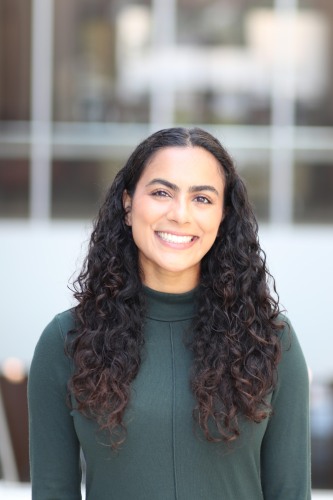
Kanika Malani MD'24 ScM'24
Biography
Master’s Thesis: “Association of Diet Quality with Risk of Incident Rheumatoid Arthritis in the Women’s Health Initiative” and “Joint Effect of Rheumatoid Arthritis and Diet Quality on Cardiovascular and Mortality Outcomes: Insights from the Women’s Health Initiative”
Residency: Kanika completed a year-long research fellowship between her third and fourth years of medical school and will be applying into internal medicine residency this year.
Following her acceptance into The Warren Alpert Medical School, Kanika Malani explored opportunities to study public health and learned about the Primary Care-Population Medicine program..
“After I spoke to some of the deans about it, I thought it would be a good fit,” Malani says. “Even though I wasn’t completely sure I wanted to pursue primary care, I was interested in the type of longitudinal and systems-based learning that you do through this program.”
“Looking forward to my career, I can see myself going into both outpatient medicine and inpatient medicine, so I’m not quite sure yet,” she says. “Being in the PC-PM program gives me exposure to both of those clinical settings and you don’t get that as much with a traditional block rotation.”
Malani also wanted population medicine to be a focus of her research, and the PC-PM program offered a good foundation for this through its master's thesis work. For her thesis, she investigated the impact of dietary quality on rheumatoid arthritis and downstream cardiovascular outcomes among postmenopausal women. The PC-PM program's master's thesis motivated her to pursue further research within preventive medicine and medical education.
Malani has focused much of her research on colorectal cancer screening and prevention, as part of the Dr. Stephen Turner Fellowship for Lifestyle and Preventive Medicine. She also studied the perspectives and outcomes of the LIC to facilitate program improvements. She says the LIC, and serving as a fellow, had a major influence on her interest in medical education.
Malani says the near-peer mentorship she received from LIC fellows during her third year inspired her to apply to become a fellow herself. The support she received from LIC fellow mentors who were closer in experience provided a more comfortable environment for her to ask questions and seek advice.
“Coming out of my third year, I was so grateful to have had LIC fellow peer mentors,” she says. “I asked them so many different questions and they consistently supported me all throughout my third year.”
It wasn’t just peer mentors who guided her, however. Malani points to PC-PM faculty like Sybil Cineas, MD, and Meghan Geary, MD, as being readily available and accessible for guidance while also granting a sense of independence with her work.
As a fellow, Malani says she helped teach content review sessions and facilitated morning reports, a role modeled on that of a chief resident. She also offered an encouraging environment for those who needed to express their difficulties and challenges in their third year. Among the lessons she shared was the importance of advocating for oneself and soliciting constructive feedback within each clinical setting. She also spoke with students about balancing clinical work with other aspects of medical school.
“Navigating the various tasks necessary for growth as learners can often feel daunting, making the development of strategies to manage this process incredibly valuable,” Malani says. “The LIC fellows program is a great example of bridging the gap between faculty and students. It provides a comfortable platform for both groups and fosters valuable opportunities for growth and teaching among third- and fourth-year students,” she says.